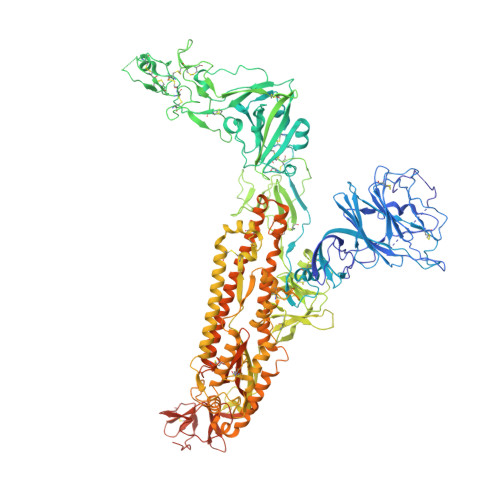TMPRSS2 and glycan receptors synergistically facilitate coronavirus entry.
Wang, H., Liu, X., Zhang, X., Zhao, Z., Lu, Y., Pu, D., Zhang, Z., Chen, J., Wang, Y., Li, M., Dong, X., Duan, Y., He, Y., Mao, Q., Guo, H., Sun, H., Zhou, Y., Yang, Q., Gao, Y., Yang, X., Cao, H., Guddat, L., Sun, L., Rao, Z., Yang, H.(2024) Cell
- PubMed: 38964329
- DOI: https://doi.org/10.1016/j.cell.2024.06.016
- Primary Citation of Related Structures:
8Y7X, 8Y7Y, 8Y87, 8Y88, 8Y89, 8Y8A, 8Y8B, 8Y8C, 8Y8D, 8Y8E, 8Y8F, 8Y8G, 8Y8H, 8Y8I, 8Y8J - PubMed Abstract:
The entry of coronaviruses is initiated by spike recognition of host cellular receptors, involving proteinaceous and/or glycan receptors. Recently, TMPRSS2 was identified as the proteinaceous receptor for HCoV-HKU1 alongside sialoglycan as a glycan receptor. However, the underlying mechanisms for viral entry remain unknown. Here, we investigated the HCoV-HKU1C spike in the inactive, glycan-activated, and functionally anchored states, revealing that sialoglycan binding induces a conformational change of the NTD and promotes the neighboring RBD of the spike to open for TMPRSS2 recognition, exhibiting a synergistic mechanism for the entry of HCoV-HKU1. The RBD of HCoV-HKU1 features an insertion subdomain that recognizes TMPRSS2 through three previously undiscovered interfaces. Furthermore, structural investigation of HCoV-HKU1A in combination with mutagenesis and binding assays confirms a conserved receptor recognition pattern adopted by HCoV-HKU1. These studies advance our understanding of the complex viral-host interactions during entry, laying the groundwork for developing new therapeutics against coronavirus-associated diseases.
Organizational Affiliation:
Shanghai Institute for Advanced Immunochemical Studies and School of Life Science and Technology, ShanghaiTech University, Shanghai 201210, China; Shanghai Clinical Research and Trial Center, Shanghai 201210, China.















